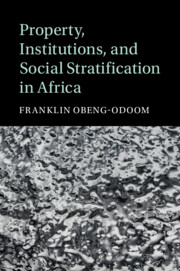Crossref Citations
This Book has been
cited by the following publications. This list is generated based on data provided by Crossref.
Obeng-Odoom, Franklin
2020.
Why inequality persists in Africa.
Review of African Political Economy,
Vol. 47,
Issue. 163,
Obeng-Odoom, Franklin
2020.
Teaching Sustainability: From Monism and Pluralism to Citizenship.
Journal of Education for Sustainable Development,
Vol. 14,
Issue. 2,
p.
235.
Obeng‐Odoom, Franklin
2020.
The African Continental Free Trade Area.
The American Journal of Economics and Sociology,
Vol. 79,
Issue. 1,
p.
167.
Shin, Bokyong
and
Boonjubun, Chaitawat
2021.
Media and the Meanings of Land: A South Korean Case Study.
The American Journal of Economics and Sociology,
Vol. 80,
Issue. 2,
p.
381.
Obeng‐Odoom, Franklin
2021.
Oil Cities in Africa: Beyond Just Transition.
The American Journal of Economics and Sociology,
Vol. 80,
Issue. 2,
p.
777.
Seguino, Stephanie
2021.
Inequality and Economic Stratification: Reflections on Bromley, Piketty, and Obeng-Odoom.
Forum for Social Economics,
Vol. 50,
Issue. 2,
p.
243.
Sclar, Elliott
2021.
The Infinite Elasticity of Air: New York City’s Financialization of Transferable Development Rights.
The American Journal of Economics and Sociology,
Vol. 80,
Issue. 2,
p.
353.
Ryan‐Collins, Josh
2021.
Private Landed Property and Finance: A Checkered History.
The American Journal of Economics and Sociology,
Vol. 80,
Issue. 2,
p.
465.
Müller-Mahn, Detlef
and
Kioko, Eric
2021.
Rethinking African Futures after COVID-19.
Africa Spectrum,
Vol. 56,
Issue. 2,
p.
216.
Obeng-Odoom, Franklin
2021.
The surplus approach to rent.
Revue de la régulation,
Vol. 31 | 2nd semestre,
Issue. ,
Asaaga, Festus A.
2021.
Building on “Traditional” Land Dispute Resolution Mechanisms in Rural Ghana: Adaptive or Anachronistic?.
Land,
Vol. 10,
Issue. 2,
p.
143.
Wang, Yiming
and
Chen, Jie
2021.
Privatizing the Urban Commons Under Ambiguous Property Rights in China: Is Marketization a Remedy to the Tragedy of the Commons?.
The American Journal of Economics and Sociology,
Vol. 80,
Issue. 2,
p.
503.
Agozino, Biko
2021.
Reparative justice: The final stage of decolonization.
Punishment & Society,
Vol. 23,
Issue. 5,
p.
613.
Sa, Haoxuan
2021.
Urban Village Shareholding: Cooperative Economic Organization in Northeast China.
The American Journal of Economics and Sociology,
Vol. 80,
Issue. 2,
p.
665.
Bertini, Rafaelle
and
Zouache, Abdallah
2021.
Agricultural Land Issues in the Middle East and North Africa.
The American Journal of Economics and Sociology,
Vol. 80,
Issue. 2,
p.
549.
Obeng‐Odoom, Franklin
2021.
Private Urban Land Tenure: Revisiting Anne Haila’s Work on its Nature, Critique, and Alternatives.
The American Journal of Economics and Sociology,
Vol. 80,
Issue. 2,
p.
291.
Agozino, Biko
2021.
Theories of industrialization in Africa: Africana industrialization discourse.
History Compass,
Vol. 19,
Issue. 6,
Boonjubun, Chaitawat
Haila, Anne
and
Vuolteenaho, Jani
2021.
Religious Land as Commons: Buddhist Temples, Monastic Landlordism, and the Urban Poor in Thailand.
The American Journal of Economics and Sociology,
Vol. 80,
Issue. 2,
p.
585.
Isiani, Mathias Chukwudi
Anthonia Obi-Ani, Ngozika
Obi-Ani, Paul
Chidume, Chukwudi G.
and
Okoye-Ugwu, Stella
2021.
Interrogating the International Monetary Fund (IMF) Policies in Nigeria, 1986–2018.
Cogent Arts & Humanities,
Vol. 8,
Issue. 1,
Darity, William A.
2022.
Position and Possessions: Stratification Economics and Intergroup Inequality.
Journal of Economic Literature,
Vol. 60,
Issue. 2,
p.
400.



